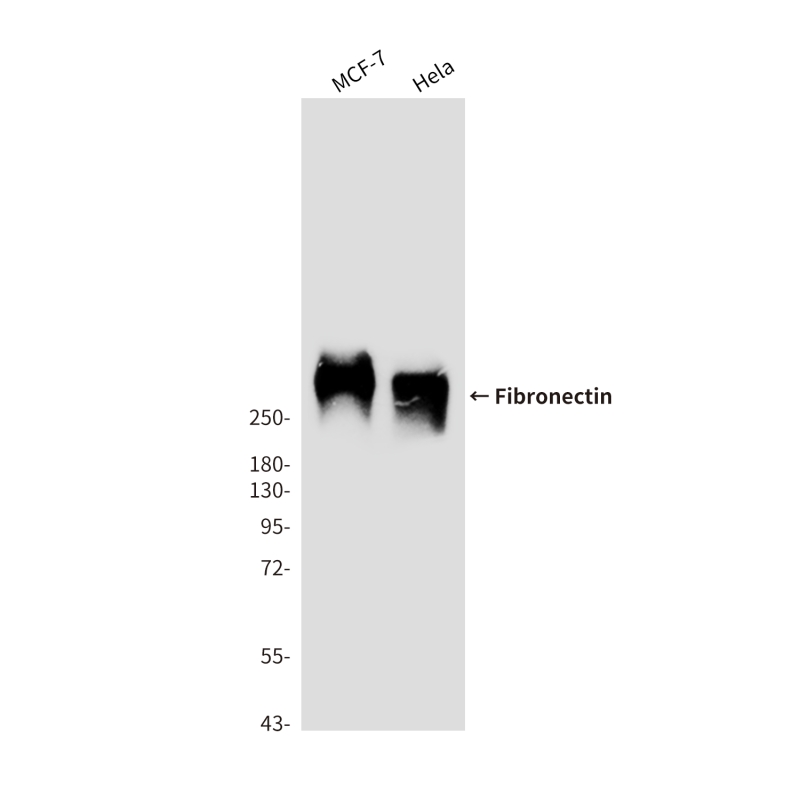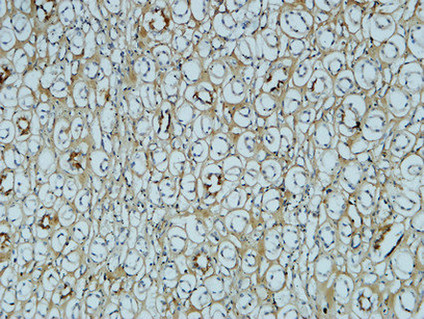

| WB | 咨询技术 | Human,Mouse,Rat |
| IF | 咨询技术 | Human,Mouse,Rat |
| IHC | 1/50 - 1/100 | Human,Mouse,Rat |
| ICC | 1/50-1/200 | Human,Mouse,Rat |
| FCM | 咨询技术 | Human,Mouse,Rat |
| Elisa | 咨询技术 | Human,Mouse,Rat |
| Aliases | FN; Fibronectin; FN; Cold-insoluble globulin; CIG |
| Entrez GeneID | 2335 |
| clone | 1E2 |
| WB Predicted band size | 272 kDa |
| Host/Isotype | Mouse IgG1 |
| Antibody Type | Primary antibody |
| Storage | Store at 4°C short term. Aliquot and store at -20°C long term. Avoid freeze/thaw cycles. |
| Species Reactivity | Human |
| Immunogen | Synthetic Peptide of Fibronectin |
| Formulation | Purified antibody in PBS with 0.05% sodium azide,0.5% BSA and 50% glycerol. |
+ +
以下是关于FN1抗体的3篇参考文献示例(内容为模拟概括,实际文献需通过学术数据库查询):
---
1. **标题**: "Fibronectin in malignancy: Antibody-based targeting of tumor microenvironment"
**作者**: Smith A, et al. (2019)
**摘要**: 该研究利用FN1抗体分析多种癌症组织中纤维连接蛋白(FN1)的表达模式,发现其高表达与肿瘤转移和血管生成相关,提示FN1抗体可能作为肿瘤微环境研究的工具或潜在治疗靶点。
---
2. **标题**: "Monoclonal antibody against FN1 suppresses fibrosis in experimental models"
**作者**: Lee J, et al. (2020)
**摘要**: 研究开发了一种特异性FN1单克隆抗体,通过动物实验证明其可抑制纤维连接蛋白的异常沉积,减轻肺和肝纤维化病变,为抗纤维化治疗提供了新策略。
---
3. **标题**: "Fibronectin isoforms detection using domain-specific antibodies in developmental biology"
**作者**: García-Sánchez D, et al. (2017)
**摘要**: 文章通过多种FN1抗体区分不同剪接变体,揭示了FN1在胚胎发育过程中动态表达及对细胞迁移和分化的调控作用,为发育生物学研究提供技术参考。
---
**备注**:以上为模拟文献,实际引用需通过PubMed、Web of Science等平台检索关键词(如“FN1 antibody”“Fibronectin antibody application”)获取真实文献。
The FN1 antibody targets fibronectin, a high-molecular-weight glycoprotein encoded by the *FN1* gene. Fibronectin plays critical roles in cell adhesion, migration, and extracellular matrix (ECM) organization. It exists in two primary forms: soluble plasma fibronectin, involved in blood clotting and wound healing, and insoluble cellular fibronectin, which forms part of the ECM to support tissue structure and cellular signaling. FN1 antibodies are widely used in research to study fibronectin's involvement in processes like embryogenesis, tissue repair, and disease pathologies, including cancer metastasis and fibrosis.
These antibodies are available in monoclonal or polyclonal forms, often validated for techniques such as Western blotting (WB), immunohistochemistry (IHC), and immunofluorescence (IF). Researchers utilize FN1 antibodies to investigate fibronectin's interaction with integrins and other ECM components, shedding light on mechanisms of cell-ECM crosstalk. In clinical contexts, altered fibronectin expression is linked to conditions like chronic inflammation, atherosclerosis, and tumor progression, making FN1 antibodies valuable tools for diagnostic or therapeutic exploration. Recent studies also explore their potential in targeting fibronectin isoforms in personalized medicine or engineered biomaterials.
×